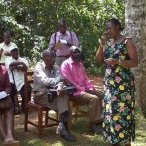English · Español

16 February 2017 | News | Land grabbing | Agroecology | Extractive industries | Food Sovereignty
Restoring the centrality of women: In response to land grabbing, the work with rural women around agroecology has been a key tool in Uganda
Download: MP3 (4.1 Mb)
Inequality rates in Uganda haven´t changed significantly in the past years, despite it being one of the economies that has grown most rapidly in the world. Uganda is one of the countries with the highest numbers of people living in rural areas (84%) in the world, and when observing what kind of development has caused some numbers in the economy to change, it is possible to understand why issues such as inequality remain.
NAPE-Friends of the Earth Uganda has been denouncing for years one of the many problems affecting rural communities in this country: land grabbing. According to the organization, among the main causes we find: palm oil monoculture plantations in Kalangala, oil extraction in Lake Albert and exotic tree monoculture plantations for the trading of carbon credits near Bukaleba and the Kikonda Forest Reserve.
Another one of the threats posed by the current agribusiness system in Uganda comes hand in hand with seed companies. NAPE is organizing public dialogues to denounce the Biosafety and Biotechnology Bill, which if passed, "would mean giving sweeping powers to the seed companies and depriving the farmers of their powers in the food production chain".
In this way, NAPE has identified some of the key elements in the defense and strengthening of Food Sovereignty. One of them is the defense of native seeds which are threatened by the advance of agribusiness.
The organization supports the development of seed banks in Butimba and Kigaga municipalities, of Hoima district, as well as in Kakindo and Mvule in Bulisa district.
The work with rural women is another of the issues where the organization is focusing its efforts. According to them: "In the oil region of Uganda (where the project has been piloted) just as in many rural parts of the country, women are the main breadwinners in their households. It is the women who mostly do the digging and harvesting food, fetching water and collecting firewood among other chores.".
In addition to denouncing the abuses faced by women when they are forced to relocate due to the scarcity of food in their communities, NAPE is also questioning how land grabbing by oil companies is affecting women in particular: "There have been examples like in the oil refinery affected communities where men have received compensation money for land on behalf of their families and run away with it leaving their wives and children stranded. We also have cases of polygamous families where a man may choose to get compensation money and relocate with one wife leaving another one and children behind stranded".
For this reason, one of NAPE´s projects aims to strengthen the voices of women, facilitating their participation in radio shows, particularly in community radio Green “to talk about their rights and to mobilize fellow community members to participate in sustainable livelihood initiatives such as food sovereignty”.
Exchanges have been led by women for women. According to the organization, "through these exchanges a lot of knowledge and skills are shared regarding food storage and different agro ecological methods ".
As a way to respond to the food crisis caused by oil exploitation in an effective way, NAPE understands the need to "restore the centrality of women in conceptualizing food sovereignty amongst the communities".
For more information:
http://www.nape.or.ug/index.php/publications/gender/51-women-led-action-oriented-booklet/file
Imagen: NAPE - FoE Uganda







